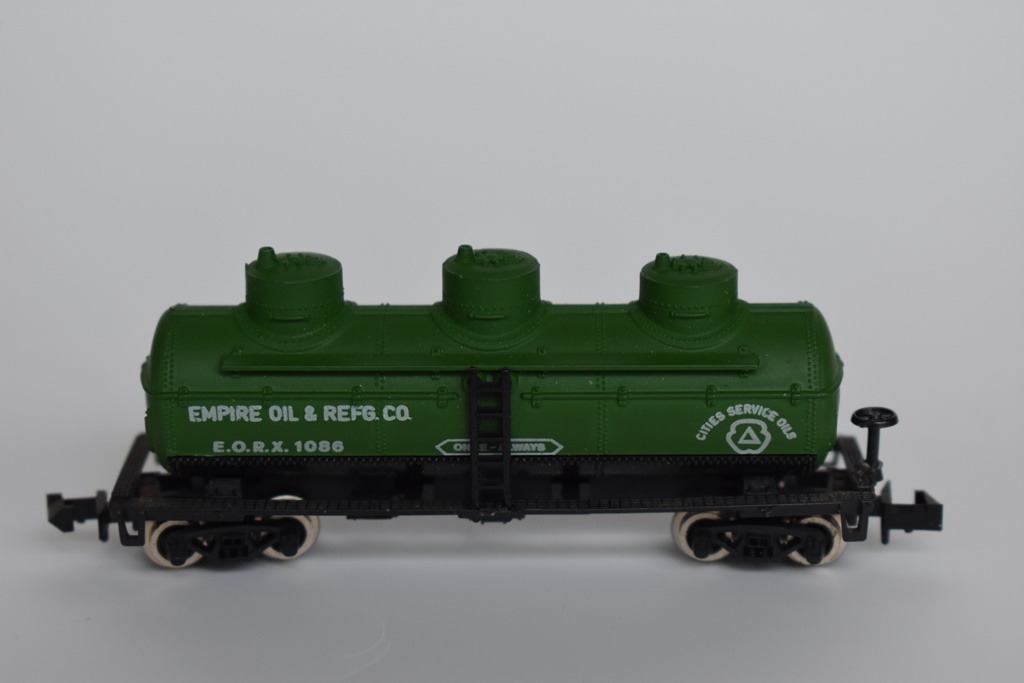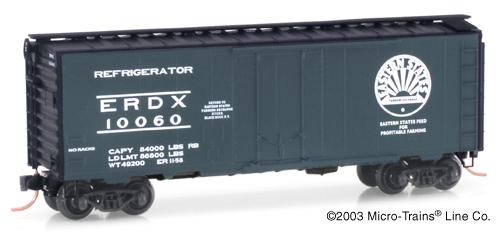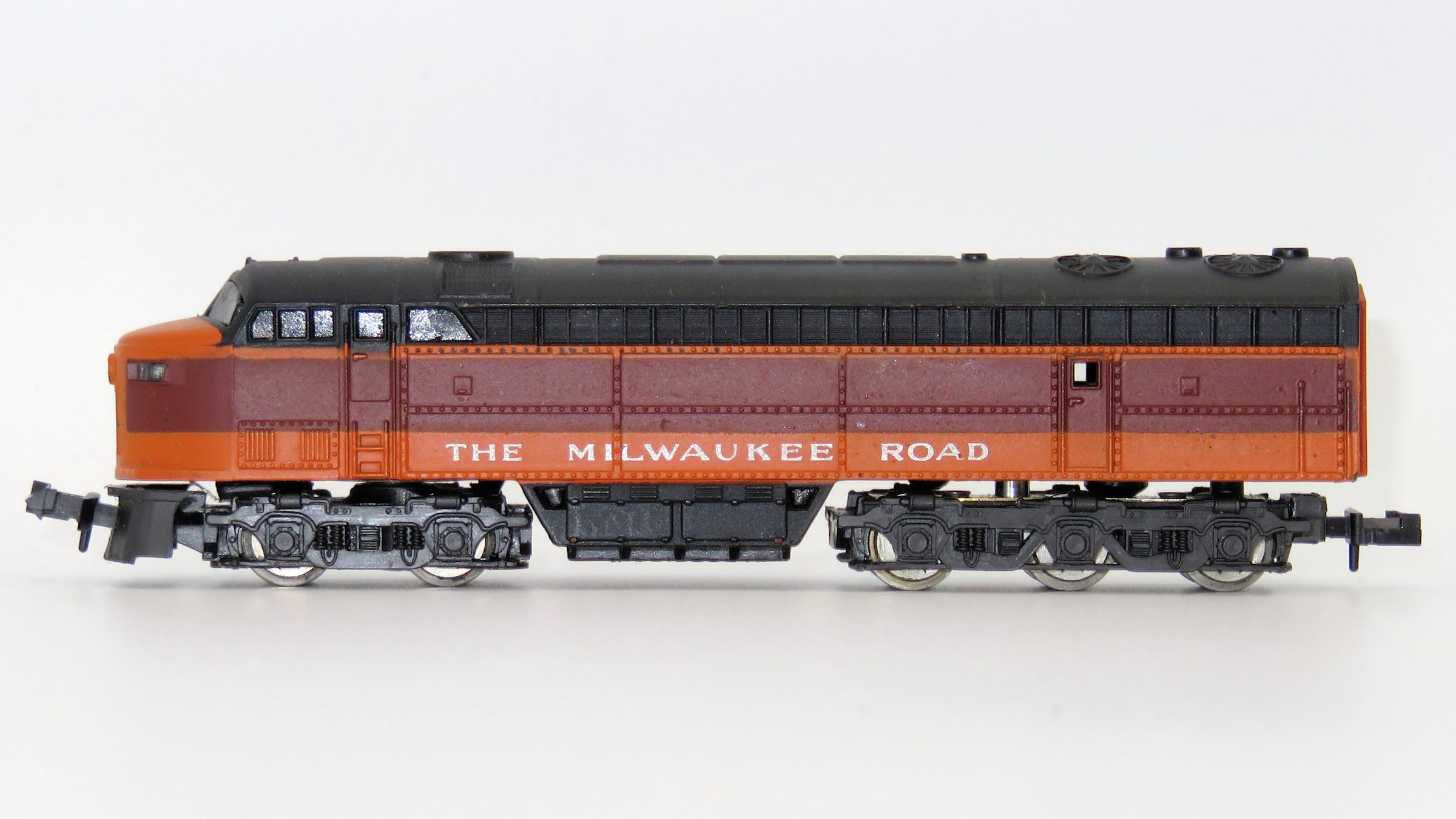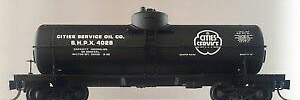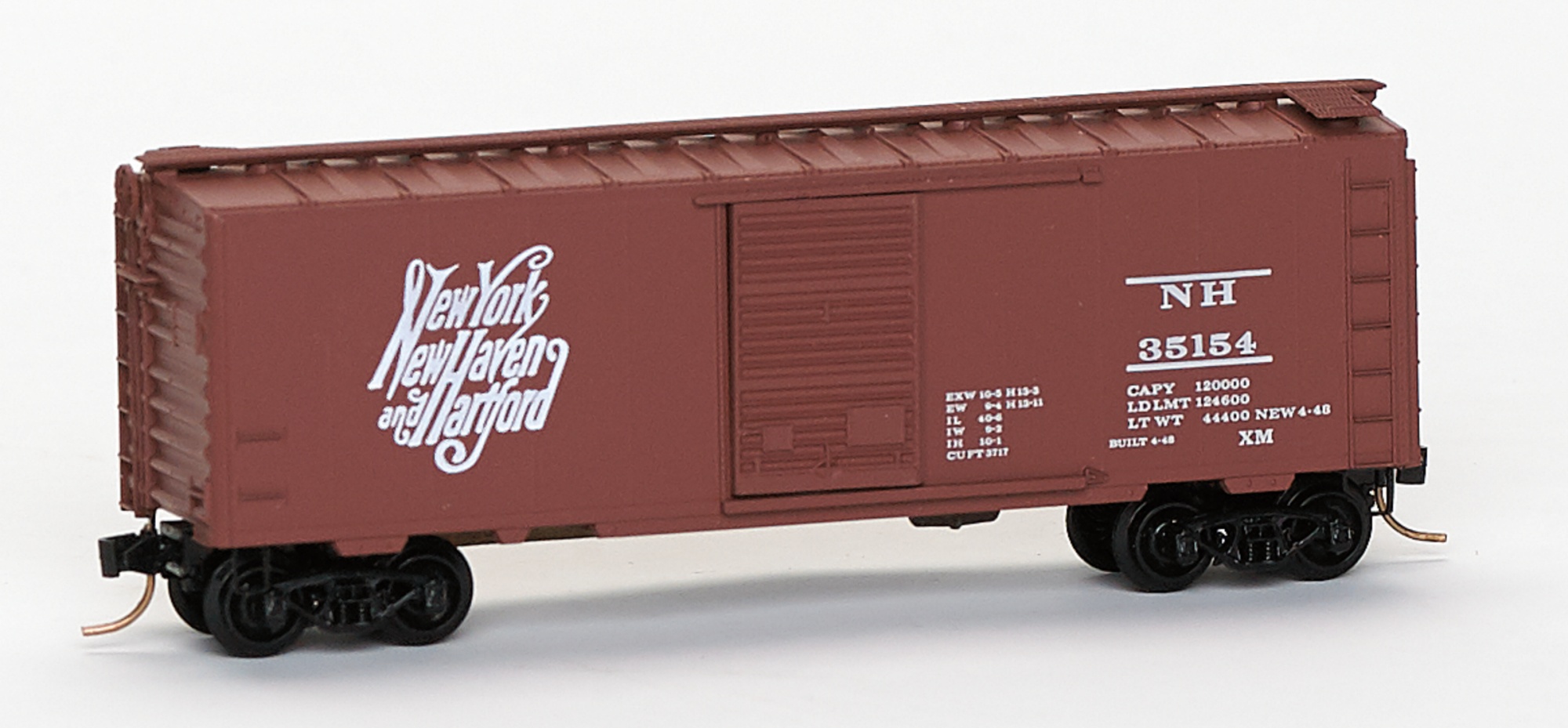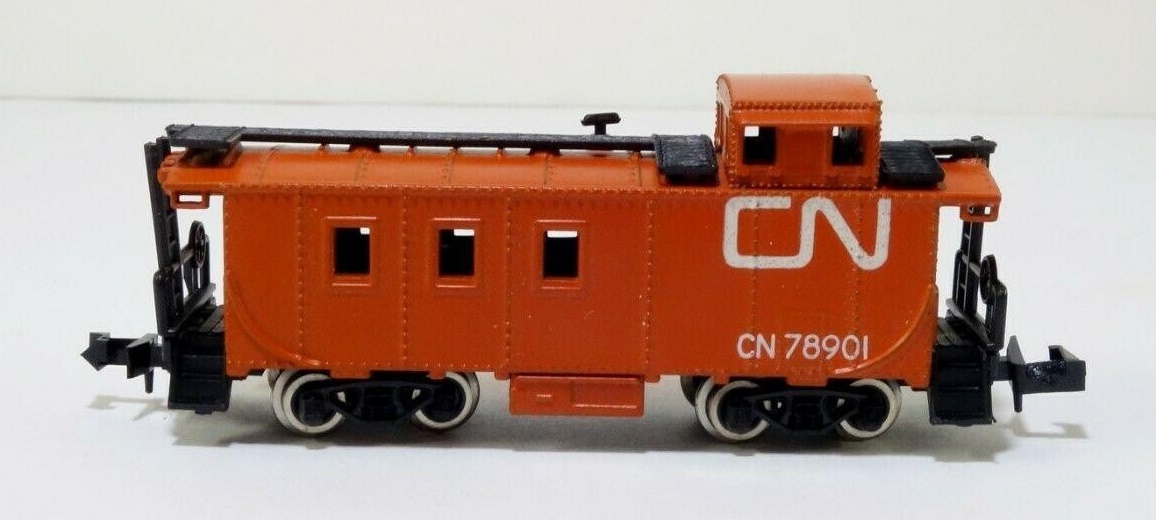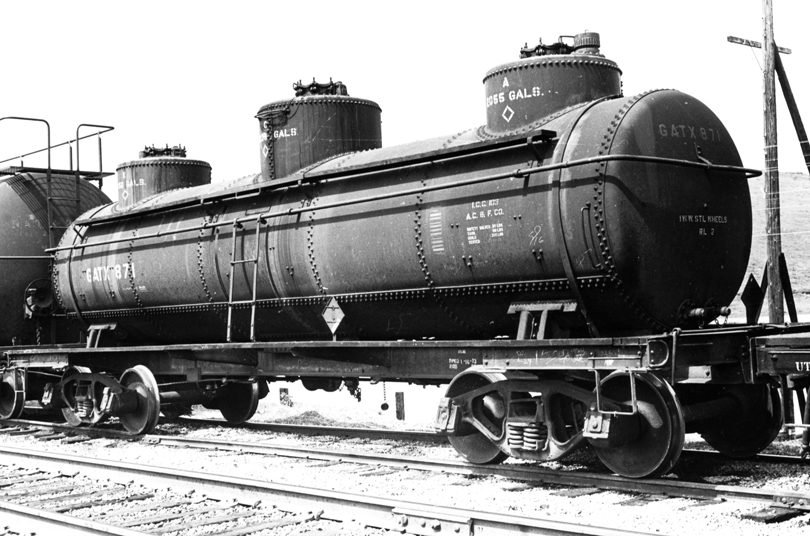Model Information: This car was first produced by Mehano in the late 1960s or early 1970s. It is essentially a knock-off of the Atlas/Roco 3-dome model from 1967. It was imported by MRC, Model Power and Life-Like. Life-Like later produced a Chinese knock-off of this car. Hence the Life-Like model is a knock-off of a knock-off. Meta-knockoff?
Prototype History: Triple Dome tank cars, while not as common as single-domes, are a railroad staple. They have been around since the first half of the 20th century.
The dome above tank cars serves as an expansion chamber as temperature affects the volume of any liquids contained within. With no dome, if the liquid did not 100% fill the tank, then it is possible for the liquid to slosh around inside the tank, causing instability and increasing the possibility of a derailment. The dome allows the tank to be slightly overfilled so that should the volume in the main section decrease due to colder temperatures or even a small leak, that there will still be sufficient liquid within to prevent sloshing. Similarly if temperature increases, the liquid can rise up inside the dome preventing excess pressure within the tank. While not as serious as an underfilled tank, an over-pressurized tank might present problems during unloading.
If you see three domes on a tank car it is because there are three separate compartments inside the tank car each containing a different liquid. This was desirable for many reasons.
Often times a delivery would consist of much less than a carload (LCL) of liquid. Remember the sloshing problem? So if you only had to fill a third of a tank with your commodity, then you can avoid the issue by using one of the three chambers within the tank car. Also, you might have several grades of a commodity to deliver such as unleaded, leaded and diesel fuel and you need them to be kept separate. Or you might be producing wine and you want your white wine kept separate from your red wine. Or maybe all three chambers had the same contents but were being delivered to three different customers. It can be very difficult to determine when one third of a single dome tank car has been discharged...
For all these reasons, three-dome tank cars were a common sight in the first half of the 20th century. However, with the rise of the interstate highway system and the modern trucking industry, LCL deliveries have primarily been accomplished with tanker trucks instead of tank cars and the three-dome tank car has gradually disappeared from the North American rail network.
The dome above tank cars serves as an expansion chamber as temperature affects the volume of any liquids contained within. With no dome, if the liquid did not 100% fill the tank, then it is possible for the liquid to slosh around inside the tank, causing instability and increasing the possibility of a derailment. The dome allows the tank to be slightly overfilled so that should the volume in the main section decrease due to colder temperatures or even a small leak, that there will still be sufficient liquid within to prevent sloshing. Similarly if temperature increases, the liquid can rise up inside the dome preventing excess pressure within the tank. While not as serious as an underfilled tank, an over-pressurized tank might present problems during unloading.
If you see three domes on a tank car it is because there are three separate compartments inside the tank car each containing a different liquid. This was desirable for many reasons.
Often times a delivery would consist of much less than a carload (LCL) of liquid. Remember the sloshing problem? So if you only had to fill a third of a tank with your commodity, then you can avoid the issue by using one of the three chambers within the tank car. Also, you might have several grades of a commodity to deliver such as unleaded, leaded and diesel fuel and you need them to be kept separate. Or you might be producing wine and you want your white wine kept separate from your red wine. Or maybe all three chambers had the same contents but were being delivered to three different customers. It can be very difficult to determine when one third of a single dome tank car has been discharged...
For all these reasons, three-dome tank cars were a common sight in the first half of the 20th century. However, with the rise of the interstate highway system and the modern trucking industry, LCL deliveries have primarily been accomplished with tanker trucks instead of tank cars and the three-dome tank car has gradually disappeared from the North American rail network.
Road Name History: 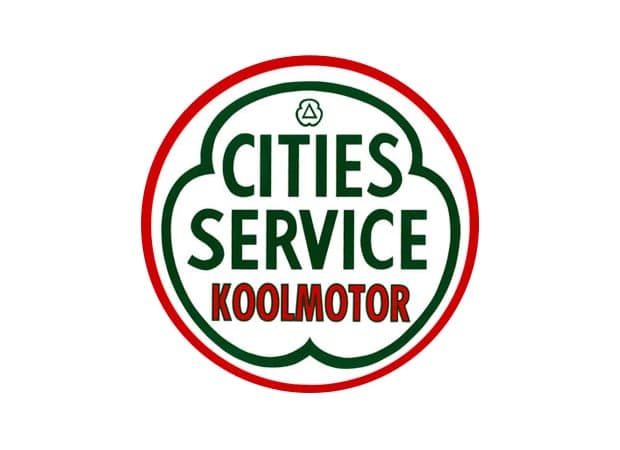 Cities Service was founded in 1910 by Henry L. Doherty.
Cities Service was founded in 1910 by Henry L. Doherty.

Brand/Importer Information: In 1952, the company Mehanotehnika was founded in Yugoslavia, which produced and sold metal and plastic products. The name comes from the name of the first puzzle toys the company made. In June 1953 production started in its own factory.
In 1959 production was moved to a new large production hall in Izola (now in Slovenia). In 1962 a new factory was opened in Materija. In 1971, the production of children's toys was moved to the factory in Materija. Besides under their own name, Mehano trains were often sold under the client's brand name such as Atlas, AHM, Life-Like, Tempo, Tibidabo and Model Power.
In 1990 the company changed its name to Mehano. In 2004 it was acquired by LIVE. In 2010 a new product line for children was launched under the name My First Train. Nevertheless, in 2012 Mehano became insolvent and was taken over by Lemke in Germany.
In the world of N Scale, Mehano products were produced under contract and imported by several other brand names for use in the US. However, a few models were imported with either "MT", "Mehano" or "Tempo" branding.
In 1959 production was moved to a new large production hall in Izola (now in Slovenia). In 1962 a new factory was opened in Materija. In 1971, the production of children's toys was moved to the factory in Materija. Besides under their own name, Mehano trains were often sold under the client's brand name such as Atlas, AHM, Life-Like, Tempo, Tibidabo and Model Power.
In 1990 the company changed its name to Mehano. In 2004 it was acquired by LIVE. In 2010 a new product line for children was launched under the name My First Train. Nevertheless, in 2012 Mehano became insolvent and was taken over by Lemke in Germany.
In the world of N Scale, Mehano products were produced under contract and imported by several other brand names for use in the US. However, a few models were imported with either "MT", "Mehano" or "Tempo" branding.
Manufacturer Information: Mehano is a Slovenian toy manufacturer located in Izola, Slovenija. The company was founded as Mehanotehnika and was producing toys starting in June 1953. They first exhibited at the Nuerenberg Toy Fair in 1959. Mehano produced a number of different locomotives and rolling stock models for the North American market in the 1960s and 1970s. Companies such as Atlas and Life-Like imported a huge variety of their products. Generally they can easily be recognized as they are stamped "Yugosolavia" on the underframe. The company was formally renamed "Mehano" in 1990. Izola today is part of the country of Slovenia since the breakup of Yugoslavia.
Mehano filed for bankruptcy in 2008, but still continued to exist and operate. Since 2012, Mehano products are distributed by Lemke.
Mehano filed for bankruptcy in 2008, but still continued to exist and operate. Since 2012, Mehano products are distributed by Lemke.
Item created by: gdm on 2022-12-05 04:48:06. Last edited by gdm on 2022-12-05 04:48:42
If you see errors or missing data in this entry, please feel free to log in and edit it. Anyone with a Gmail account can log in instantly.
If you see errors or missing data in this entry, please feel free to log in and edit it. Anyone with a Gmail account can log in instantly.


